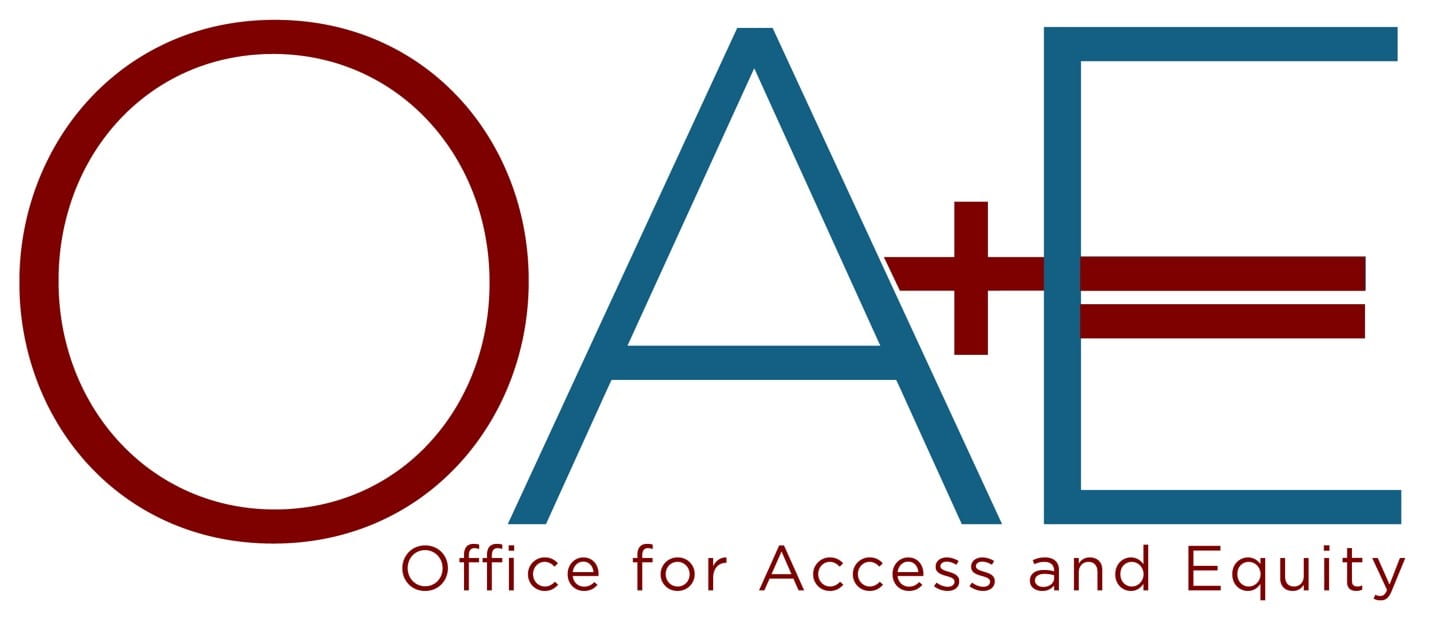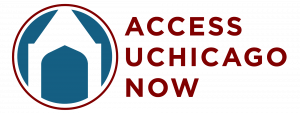Winter 2021 Newsletter

Winter Quarter Newsletter
2021 v.1
Thank you for signing up for the Office for Access and Equity listserv. Each quarter we hope to bring you engaging content regarding the work, vision, and commitment to access and equity at the University. As you continue through Winter Quarter, OAE remains a resource for you.
The Office for Access and Equity (OAE) supports the full participation of all members of the University community while maintaining a commitment to fair process, compassion and creativity. On a day to day basis, OAE receives reports, provides support and resources, and offers resolution options under the University’s Policies on Harassment, Discrimination and Sexual Misconduct and Title IX Sexual Harassment, removes barriers to participation for people with disabilities, and provides educational offerings to the campus community.
Like to learn more? Visit our website or contact us by email at equalopportunity@uchicago.edu or by phone 773.834.OEOP (6367).
In this Issue:
Learn. Creating Accessible PDFs; Honoring Black History Month.
Share. Equal Opportunity Programs partnerships in preventing sexual harassment.
Connect. Access UChicago Now; COVID-19-related accommodations; Report a Campus Access Barrier.
LEARN
An Introduction to Creating Accessible PDFs
Creating accessible content ensures that the widest possible audience can fully understand your intended message. The newly enacted Digital Accessibility Policy also puts in place standards for accessible content. OAE would like to share tips and additional resources from the Center for Digital Accessibility (CDA) to help you create accessible content, specifically accessible PDFs.
Before creating content as a PDF, consider your options:
Creating an accessible PDF can be challenging. The easiest way to make content within a PDF accessible can often be to create content in another format. The CDA has additional resources to guide your choice in selecting the easiest way to create accessible content, such as considering web content or partnering web content and content in an accessible document.
If you choose to create a PDF, make it accessible:
STEP 1:
Create an accessible document in the source application. The CDA’s resources on Accessibility for Content Creators will help you create accessible content in Microsoft Word, Microsoft PowerPoint, Microsoft Excel and InDesign.
STEP 2:
Export the document properly to the PDF format. Converting your document to PDF using the “print to” feature does not always preserve all accessibility features. Instead, import or export your document to PDF to help maintain the accessibility of your document.
STEP 3:
Apply the finishing touches in Adobe Acrobat. Accessibility check tools are available in Adobe and can help you identify potential concerns. More information is available through the CDA and through Adobe’s resource, Create and Verify PDF Accessibility.
Creating accessible content will be easiest if you keep accessibility in mind at the start of your process. These three steps provide a general framework for this process and resources through the CDA can guide you through specific issues.
Honoring Black History Month
Black History Month began as a week, established by historian Dr. Carter G. Woodson in 1926, to honor the history of African Americans, during the second week in February at the present-day Association for the Study of African American Life and History. ASALH expanded this to Black History Month in 1976 and Congress adopted National Black History Month in 1986. (ASALH; Library of Congress). Dr. Woodson led the establishment of publication and research outlets for African American scholars, which include the present-day Black History Bulletin (established in 1937), for the general public as well as teachers with a belief in the importance of promoting the teaching of black history throughout the year. (Daryl Michael Scott in the Black History Bulletin v.74, no.2)
Black History Month is one month that encourages us to acknowledge and support the historical and current contributions of African Americans throughout the year. OAE surveyed colleagues within EOP to ask how they plan to commemorate Black History Month. Here are a few approaches our team is taking.
- Learn about the contributions of African Americans in history, including veterans and service members.
- Watch Black History Month Celebration: Honoring African American Service Members and Veterans hosted by the Office for Military-Affiliated Communities in EOP and, in recognition of our heroes, participate in OMAC’s Veteran Black History Month trivia challenge. The top 3 winners will receive a $25 Amazon gift card. To participate please visit download the trivia flier and complete your answer response form. The trivia challenge will be active throughout the month of February and winners will be announced in early March.
- Review resources from Reflections on Race: A Multimedia Resource Guide created by the University of Chicago’s Diversity + Inclusion team.
- Check your bookshelves, including your children’s books, (and other media) and consider broadening them to include books, television/ movies, podcasts, etc. that center and support more African Americans.
- Talk about it. Share and discuss what you learned with family, friends and colleagues and continue to acknowledge the work and legacy of African Americans throughout the year.
(OAE also acknowledges the work of the writers and editors at the Anti-Racism Daily for their research and writings on the ways to Honor Black History Month with action and their 28 Days of Black History, both of which provided background for this overview.)
Additional Resources
- Office for Access and Equity Brochure
- The Choice is Yours: Resolution Options
- Accessible Events Resource Guide and Accessible Events Resource Guide Checklist
- Reasonable Accommodation Process for Faculty, Other Academic Appointees, and Postdoctoral Researchers Summary
- Archives of the OAE newsletter are available on our website.
To request a training or workshop, contact OAE by email at ehonig@uchicago.edu or by phone at 773.834.OEOP (6367).
SHARE

Action Collaborative to Prevent Sexual Harassment in Higher Education
The Director of Education and Outreach for Equal Opportunity Programs, Vickie R. Sides, along with the Associate Provost, Bridget Collier and Biological Science Division faculty member and Chair of the Faculty Panel on Unlawful Harassment, Nancy Schwartz, represent the University of Chicago as members of the National Academy of Science, Engineering and Medicine’s Action Collaborative to Prevent Sexual Harassment in Higher Education. The Action Collaborative brings together leaders from over 60 academic and research institutions and key stakeholders to work toward targeted, collective action on addressing and preventing sexual harassment across all disciplines and among all people in higher education.
In addition to annual meetings and public workshops, the Action Collaborative working groups and subcommittees have identified and compiled promising practices within and across respective institutions. The working groups and subcommittees provide opportunities for learning from one another and developing new approaches to address barriers and challenges that arise when implementing promising practices.
Vickie Sides sits on the Communications subcommittee of the Response Working Group. This working group focuses on eliminating the ‘Pass-The-Harasser’ phenomenon, whereby those who commit sexual harassment, resign and move to a different institution that is unaware of their activities. To date, the committee has collected innovative anti-pass-the harasser policies from other universities and is exploring legal and policy implications for sharing information related to misconduct and moving towards drafting a paper on developing and implementing anti-pass-the-harasser policies.
CONNECT

Leadership, Transparency, and Empowerment around Access
Access UChicago Now (AUN) is a coalition that provides leadership and transparency regarding accessibility for the campus community. AUN works to empower units, divisions, and schools to make University education, research, work, events, and other programs and services that are a part of University life accessible to members of the campus community of differing abilities.
AUN has created a new website for the University to serve as a central hub for accessibility resources across campus. Learn more about AUN in its 2019-2020 Annual Report or subscribe to the Access UChicago Now listserv to receive updates and communication about the coalition.
COVID-19 Accommodations
Members of the campus community may request accommodations related to COVID-19.
Faculty, other academic appointees, and postdoctoral researchers requesting accommodations may contact OAE. For additional information for students, contact Student Disability Services or your Dean of Students, and for staff, contact Employee & Labor Relations or your Human Resources Partner.
For all other questions, contact OAE.
Have you noticed an access barrier on campus?
Report physical barriers to Facilities Services online (indicating that it is an access request) or via email at work-center@uchicago.edu. For urgent requests, call 773.834.1414. You may also report any physical, technological, or other barriers to OAE online or by phone at 773.834.OEOP (6367).
Report digital accessibility barriers to the Center for Digital Accessibility or contact the CDA at digitalaccessibility@uchicago.edu.
Contact Us
Liz Honig
Director, OAE/ Deputy Title IX Coordinator
773.702.4913
